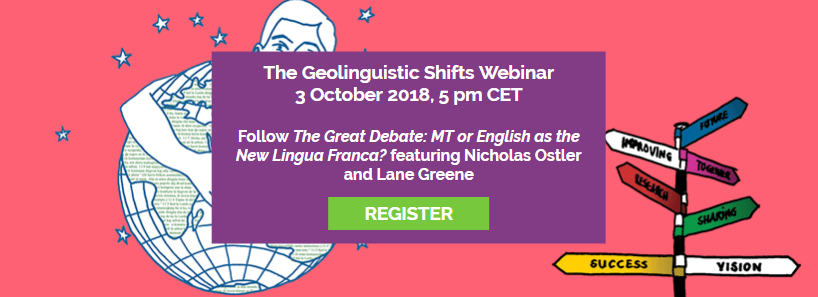Four years ago in June, 2014, TAUS held its Industry Leaders Forum at Clontarf outside Dublin in Ireland. The event’s highlight was a formal debate between Nicholas Ostler, a well-known writer on language in history, linguist and specialist in Endangered Languages, and Lane Greene, a journalist with The Economist and a regular columnist on language-related questions.
The motion was: will (machine) translation (Ostler) or English as a common language (Greene) win out in the global language stakes in the years ahead? Global multilingual communication? Or the use of a lingua franca for major communicational needs? After voting, the “translationists” won, but fairly narrowly!
If we ran the debate again today would the community return the same result a second time round? How has thinking on the multilingual vs. common language question evolved since the explosion of connected technology, platform economics, the rise of AI and populist politics, and unnerving moves in the global power struggle?
To kickstart this ideas-fest, we shall be publishing articles by both Nicolas and Lane, and crown it all with a live webinar on Geolinguistic Shifts October 3, 2018. Everyone is warmly invited to this online event.
As a stage-setter, here are some thoughts about three distinct issues that touch on this translation vs. monoglot debate. They need exploring further to get grips with what is a truly epochal concern.
a) Conjugations & declensions. In his article in The Guardian on reactions to global English, Jakob Minakowski reckons that on balance humanity will continue to evolve within or towards a polyglot state, because creating novel blends and distinctions has always been our experience of language. In our Nunc est Tempus ebook (2017), we note how the multipolar political map of the world is redistributing the balance of language power. China is investing deeply in Han language content production. Technology and demographics are enabling the many regional languages of India to play a greater role in the national conversation; a growing number of African languages, especially in South Africa, Kenya and Nigeria, are being “digitized” through mobile usage or natural language processing research. The trend to populist politics, moreover, should support local language usage at the expense of an elitist foreign tongue. And the constant quest to reach more markets for the global entertainment industry is encouraging localization across a richer portfolio of spoken languages. Yet automatic translation is still stuck at around 100 languages in a world of some 6,000 (but rapidly decreasing) tongues, with relatively few distinct pairs in everyday use. Is global multi-to-multi translation a truly scalable solution?
b) Languages mutate. Is the imposition of one language as a lingua franca onto the world’s many tongues a zero-sum game? Will the specific cognitive biases inherent in English cause the wealth of modes of expression intermixed within each language to disappear? Or on the contrary, would a lingua franca expand our mental repertoires by blending new ways of “languaging” into the substrate of English? To simplify wildly, what would emerge from English’s communicational hegemony would not be the language we know but a new language variant that would itself change and adapt over time. A lingua franca would then kickstart a new cycle of development, rather as Latin eventually fissured into the Romance languages. Anticipating this, would we consciously plan to move towards a single language? Or simply fight things out among a small set of tongues? Or just wait and see…
c) Bug or feature? There is broad humanistic support (especially in the language industry!) for maintaining and expanding linguistic diversity and meeting the communication challenge it raises by extending the dominion of translation. In this view, multilingualism is as constituent a feature of the human condition as sexual reproduction, and should therefore be celebrated and preserved. But what if multilinguality turns out to be a bug rather than a welcome feature of the human condition? What if in years to come an Artificial General Intelligence came to the conclusion that the overall cost in money, time and cognitive effort for translation as a mechanism for “overcoming the language barrier” was too high? What if monolingual talk offers a far better “ecological” solution for communicating on a small planet as it began a new age of space colonization in an effort to stay alive in a dimming solar system?
Please send in any thoughts on these and any related questions so we can prepare for a rich discussion at the TAUS Webinar on October 3, 2018. And watch out for articles from Nicholas Ostler and Lane Greene in the weeks ahead!

6 minute read


